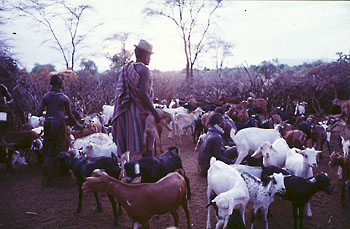The ongoing drought in Ethiopia and now also in Kenya raises a question - why are these countries sitting on the source of the Nile prevented from using water for the needs of their residents?
Dr. Assaf Rosenthal

Lake Victoria in East Africa is the largest in Africa and one of the largest in the world. The lake is the beginning of the Nile (Blue) and provides about 15% of the Nile's water. Lake Tana in Ethiopia supplies about 85% of the water to the Nile through the White Nile.
That is, Ethiopia, Kenya, Uganda, Tanzania and others sit on one of the largest and most important natural treasures in Africa - water. But May……. Following the enforcement of a draconian agreement on all the countries along the banks of the sources of the Nile, those countries are prohibited from using the water. The agreement was enforced on all countries by the British at the beginning of the 20th century when the right to use the water was given only to the Egyptians.
A number of years ago the Straits agreed to "share" a little about 15% of the water to Sudan. East African countries and the Horn of Africa are still prohibited from using any water (excluding fishing). Despite repeated attempts, permanent committees, discussions that last for years, to this day there is no agreement from Egypt to allow additional use of the Nile water and its sources, every time one of the countries declares an intention to establish an irrigation system, or any other attempt to use the water threatens the Straits with war!
The greatest dependence, the greatest need for Nile water is in Ethiopia and Kenya. Ethiopia, where most of its inhabitants are farmers who live off their produce, is known for the periods of famine that often afflict it. It is true that famine mainly affects the dry and desert east of the country, but with the help of the water from Lake Tana, the east of Ethiopia could be turned into a blooming garden. To this day, that region of land that could be a blooming garden is a parable and a place where we are persecuted for all the phenomena of poverty and hunger in the world.
In Kenya, hunger was not common until recently. After two years in which the rains failed, millions of Kenyans are at risk of starvation. Again the problem is more severe in the east (north) of Kenya where mainly shepherds and cattle herders live. Stopping the rains means lack of pasture. The result: thousands of shepherds, their flocks and cattle invade agricultural fields and into nature reserves - the forested area of Mount Kenya was flooded. About 40 thousand heads of cattle that threaten to eliminate one of the symbols of nature and landscape in Kenya. The famous shepherds of Kenya - the Maasai, brought their herds to the capital - Nairobi.... where they cut grass in squares, gardens and private areas.
Many environmentalists claim that the severe drought is affected by years of severe damage to the forests in Kenya, but again with the help of the amounts of water that can be transported from Lake Victoria, it was possible to prevent damage to the forests on the one hand, and on the other hand, during drought seasons, it was possible to irrigate agricultural areas and pastures.
Now we will return to our neighbor and the flowing Lior in its center. Elsewhere I told about the megalomaniac water plants of the Egyptians designed for irrigating desert areas west of the Nile. Even we had (for a moment) hope of receiving water from the light. It is true that Egypt is not exactly at the top of the developed countries and the situation of many of its residents is not far from that of Ethiopian farmers or Kenyan herders, but nevertheless the jarring question arises as to who has the fundamental/primary right to use water…….?
A compilation of Dr. Assaf Rosenthal's articles
Uganda drains Lake Victoria
News agencies, news and Walla
Uganda. The situation may cause a conflict between African countries due to competition for water. The country draws from the lake 50% more than is allowed in its water agreements with the countries of the region. The water level in the lake is the lowest in the last 80 years
Uganda is pumping from Lake Victoria beyond what was agreed in its water agreements to generate more electricity, and estimates are that it is responsible for more than half of the decline in the lake's water level.
The BBC reports that Tanzania and Uganda blamed the drop in water levels on drought, but water engineer Daniel Cole claims that the drought only caused half of the drop in water levels. The water level in Adam Victoria is the lowest in the last 80 years. Experts estimate that the situation may cause a conflict between African countries over competition for water.
Cole, a hydrologist by profession who works with the United Nations on natural disaster reduction and water projects in Nairobi, said that in the past two years, Uganda has pumped more than 55 percent of what it was supposed to pump according to its water agreements with the countries of the region.
The water is used to generate electricity, in the area where the Nile begins, from Lake Victoria. "The water level in the Nile should have been 45 centimeters higher today, if Uganda had followed the agreements for the use of water from the lake," Cole said. "This mess is worth pulling the plug out of Lake Victoria," said Frank Murmuzi, of the National Union of Professional Environmental Quality in Uganda.
The situation today is that Egypt receives most of the water, while countries such as Ethiopia, Uganda and Kenya are interested in changing the existing situation, and changing the current water agreements.
https://www.hayadan.org.il/BuildaGate4/general2/data_card.php?Cat=~~~390529335~~~218&SiteName=hayadan
